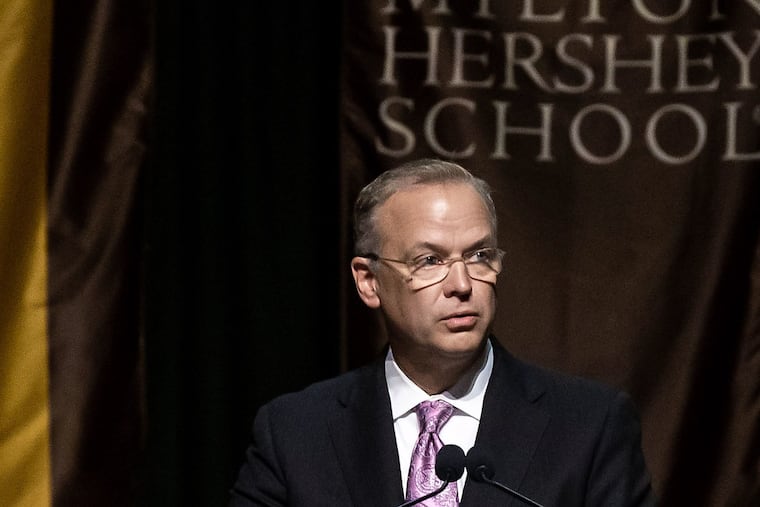‘Have they locked the doors?’ Judge presses for details on Hershey charity spat with board member.
With claims of millions of dollars unaccounted for at the Milton Hershey School, a judge considered Tuesday whether a board member's lawsuit for access to financial records should go forward.

The mounting feud between Pennsylvania’s wealthiest charity and one of its board members was on full display in a Harrisburg courtroom Tuesday, as a judge pressed lawyers for both sides on the details of a months-long fight over internal spending details.
Robert Heist, the board member, has said in court records that millions of dollars have gone unaccounted for at the Milton Hershey School and that he’s been denied access to financial records that would help explain why.
Lawyers for the school counter that Heist “has an agenda,” has “no authority to conduct his own investigation,” and is wasting school resources in his quest for documents.
» READ MORE: The Milton Hershey School promises college but leaves some behind and in debt
The suit is the latest in a series of controversies for the Milton Hershey School, the nation’s richest K-12 school, whose board members have been investigated over the last decade for buying a golf course with school funds, lavish travel, and spending millions of dollars investigating each other.
In an unusual move for a sitting board member, Heist sued the school earlier this year to obtain financial documents. Now, it’s up to Dauphin County Judge John McNally to decide whether the suit should go forward or be dismissed.
» READ MORE: America’s richest school serves low-income kids. But much of its Hershey-funded fortune isn’t being spent.
Heist sued the school “reluctantly and only after numerous unsuccessful efforts” to obtain spending details from MHS officials, according to court records. Heist says he has been trying to access this information since September 2019, including making no fewer than five requests in early 2021 to the current board chair, M. Diane Koken, a former Pennsylvania insurance commissioner.
Lawyers for the school say it has already given Heist thousands of pages of documents in response to his requests.
The dispute is all the more surprising given that Heist — a 1982 graduate of the Milton Hershey School — has served on its board since 2011, including several years as board chair. Earlier this year, Heist withdrew his vote in favor of the school’s annual budget, on the grounds that he didn’t have all the necessary information, his lawyer said.
Directors of a charity typically have access to financial documents. “A director of a nonprofit corporation in Pennsylvania is fundamentally allowed to see the books and records of the organization to determine whether the funds are being spent properly,” Don Kramer, chairman of the nonprofit practice at Philadelphia law firm Montgomery McCracken, said earlier this year.
Lawyers for the Milton Hershey School argued that Heist was never actually denied access to the records; his lawyer, Eileen Ficaro, countered that the school still has not given him access. Heist did not attend the hearing.
During the hearing, McNally appeared skeptical of some of Ficaro’s arguments, pressing her on whether the school’s response to Heist was, in fact, a denial.
“Have they locked the doors? Have they shuffled the documents from place to place so he couldn’t access them?” he asked. And he pressed her several times on whether Heist had requested the records again since filing the suit.
Founded in 1909 by candy tycoon Milton S. Hershey, the school educates and houses roughly 2,100 low-income students, at no cost. For years, critics have argued that the school, which is funded by a $17 billion endowment, including a controlling stake in the Hershey Co. snack giant, should spend much more than it does.
Under pressure from the state Attorney General’s office, the school last year announced it would use some of an accumulated $1 billion in unspent income to build and operate six preschool centers around the state. In five years, the centers will serve roughly 900 impoverished children — a significant expansion of the school’s mission.
Heist is seeking thousands of pages of documents related to MHS’s legal expenses and insurance coverage for legal expenses; one of his concerns, court records show, is that the school was spending money on legal fees that should have been covered by insurance. Legal and insurance costs increased by 74% between 2017 and 2019, according to the charity’s IRS filings.
During that time, the charity defended itself against two federal lawsuits. In one, a former student claimed he was expelled after an attempted suicide. In the other, the parents of a former student claimed their daughter was not allowed back on campus after being hospitalized for depression. She took her life two weeks later. Both cases were dismissed.
The school is also defending itself and its board members, including Heist, against a lawsuit in New York brought by an activist and alum, lawyer F. Frederic Fouad, who claims that the charity has harassed him.
Among the records Heist sought were documents with his signature authorizing legal expenses, Thomas Leonard, a lawyer for the Milton Hershey School, told the judge. “He’s trying to figure out what he signed and didn’t sign,” Leonard said.
The hearing ended with both parties agreeing to provide the judge, under seal, a March 24 letter containing confidential information in which Heist laid out why he was seeking the records — perhaps an ironic turn of events, the judge mused Tuesday, for a lawsuit focused on transparency and openness.
The state Attorney General’s Office oversees charities and Mark Pacella, who heads its charities division, attended the hearing. “We have been monitoring the case and we’re very interested in the outcome,” he said.